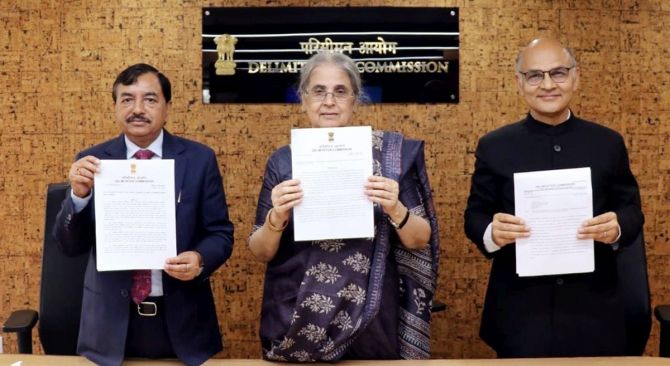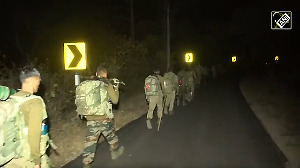The Supreme Court on Monday dismissed a plea challenging the validity of delimitation of constituencies in the Union Territory of Jammu and Kashmir, saying there was "nothing illegal" about the exercise.

A bench of Justices SK Kaul and A S Oka, however, said it was not dealing with the validity of the matter concerning the abrogation of Article 370 of the Constitution as it was pending before another bench of the apex court.
Dismissing a plea filed by two Kashmir residents challenging the Centre's decision to constitute the delimitation commission for redrawing the legislative assembly and Lok Sabha constituencies in the UT, the bench referred to Articles 3, 4 and 239A of the Constitution and said Parliament was empowered by law to create a body of legislature for the UTs of Puducherry and J&K.
Reacting to the SC verdict, the National Conference said it is not "heartbroken" and was sure of a victory in the petitions challenging the abrogation of Article 370 by the Centre while People's Democratic Party president Mehbooba Mufti said the dismissal order was immaterial when legal challenges to abrogation of Article 370 and J&K Reorganisation Act were pending before the apex court.
"We have rejected the delimitation commission from the outset. It does not matter to us what the verdict is,” Mehbooba told reporters.
The Congress unit of J&K said it was disappointed with the verdict.
The apex court also held there is "no illegality" associated with the establishment of the delimitation commission under the March 6, 2020 order by which the Centre had constituted a delimitation commission for redrawing the constituencies in the UT.
"...There is nothing illegal about the exercise of delimitation/readjustment of the constituencies undertaken by the delimitation commission for the purposes of dividing the Union Territory into 90 constituencies on the basis of the 2011 census figures," the bench said in its 54-page verdict.
The plea was filed by Haji Abdul Gani Khan and Mohammad Ayub Mattoo.
The bench, however, clarified that the findings rendered in the judgement are on the footing that the exercise of power made in 2019 under clauses (1) and (3) of Article 370 of the Constitution is valid.
"We are aware that the issue of the validity of the exercise of the said powers is the subject matter of petitions pending before this court. Therefore, we have not dealt with the issue of validity. Nothing stated in this judgement shall be construed as giving our imprimatur to the exercise of powers under clauses (1) and (3) of Article 370 of the Constitution," it said.
The top court is seized of petitions challenging the constitutional validity of the Centre's decision to abrogate provisions of Article 370 on August 5, 2019.
Several petitions have been filed in the apex court challenging the Centre's decision to abrogate provisions of Article 370 and the J&K Reorganisation Act, 2019, which split J-K into two Union Territories — Jammu and Kashmir, and Ladakh.
By abrogating Article 370, the Central government revoked the special status of Jammu and Kashmir.
In its verdict delivered on Monday, the bench noted that during the hearing, the counsel appearing for the petitioners attempted to assail the validity of certain provisions of the J&K Reorganisation Act.
It noted that initially, the counsel said the petitioners did not wish to challenge the provisions but subsequently, he argued that a challenge to relevant provisions of the J&K Reorganisation Act was implicit in this plea.
The bench said there cannot be any doubt that when a party wants to challenge the constitutional validity of a statute, he must plead in detail the grounds on which the validity of the statute is sought to be challenged.
"The constitutional courts cannot interfere with the law made by the legislature unless it is specifically challenged by incorporating specific grounds of challenge in the pleadings," it said and added, "the reason is that there is always a presumption of the constitutionality of laws."
It said a constitutional court cannot "casually interfere" with legislation made by a competent legislature only by drawing an inference from the pleadings that challenge to the validity is implicit.
The bench said a statute cannot be interpreted in a manner that will render some of its provisions "otiose" and it must be construed and interpreted in such a manner as to make it workable.
The bench also noted that the petitioners were also not questioning the 2019 Presidential Order.
"Therefore, we will have to proceed on the footing that the 2019 Presidential Order, the said declaration and the provisions of the J&K Reorganisation Act are valid," it said.
The bench said it also find that even if the law made by parliament creating a body of legislature for UTs of Puducherry and J&K has the effect of amending certain parts of the Constitution, it shall not be deemed to be an amendment of the Constitution for the purposes of Article 368 (power of parliament to amend the Constitution and procedure).
It said once the delimitation commission was established, there was nothing wrong if the Centre extended the period of appointment of the chairperson till the task of delimitation or readjustment was completed.
The bench noted that another challenge was to that part of the second notification of March 31, 2021, by which states of Arunachal Pradesh, Assam, Manipur and Nagaland were excluded from the purview of the delimitation commission constituted under the March 6, 2020 notification.
It noted that section 10A of the Delimitation Act, 2002 itself permits the postponement of the exercise of delimitation in certain contingencies.
"Moreover, the position and the status of the newly created Union Territory of J&K under the Constitution is completely different from the four North-Eastern states," it said.
The plea had also sought a declaration that the increase in seats from 107 to 114 (including 24 seats in Pakistan-occupied Kashmir) in J&K is ultra vires constitutional and statutory provisions, particularly under section 63 of the Jammu and Kashmir Reorganisation Act, 2019.











 © 2025
© 2025